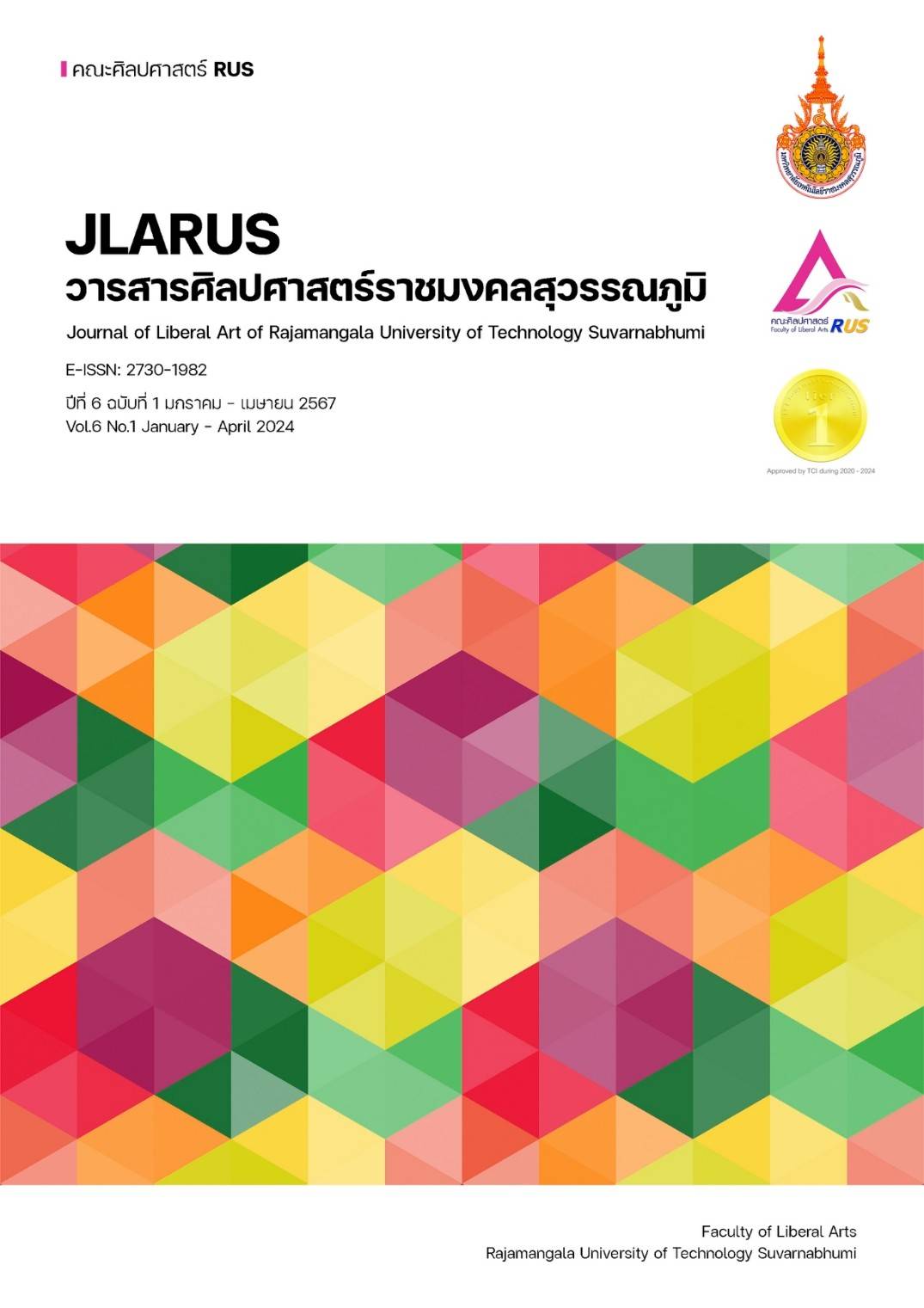A REFLECTION OF THE CONCEPT OF SUFFICIENCY ECONOMY IN PASA PATEE THAI LANGUAGE TEXTBOOKS
Main Article Content
Abstract
The objective of this research article was to examine the Thai language textbooks used in Grades 1-6 regarding reflection on the concept of Sufficiency Economy that appears through characters in the textbooks’ main stories. A series of six Thai language textbooks, “Language for Life: Pasa Patee,” for Grades 1-6, was selected for this research. The scope of content was related to their main stories in 88 lessons. Documentary research was employed to collect data from the 88 lessons and examine related research studies. The data was analyzed, and the results of the research were presented, using descriptive analysis, followed by a summary and a discussion of the results.
According to the results, the stories in the textbooks reflect the concept of Sufficiency Economy in all aspects. That is, the series reflects three components: (1) moderation, which reflects the concept of living life in moderation, without extravagance, and being self-reliant; (2) reasonableness, which reflects the concept of carefulness and the use of intelligence to consider the consequences of one’s actions; and (3) self-immunity, which reflects the concept of preparation for impacts that will occur from life changes. Besides the three components, the textbooks also reflect two conditions: (1) knowledge, which reflects the concept of (1.1) living life carefully, and (1.2) living life wisely, (1.3) living life guardedly; and (2) ethics and virtues, which reflect the concept of (2.1) living life with honesty and integrity, (2.2) living life with perseverance and patience, and (2.3) living life based on mindfulness and wisdom in living life.
In terms of the body of knowledge, the reflection of the Sufficiency Economy concept in the textbooks reveals the inculcation of ethics into the youth so that they behave according to the principles of the Sufficiency Economy and live peacefully in the current situation.
Article Details

This work is licensed under a Creative Commons Attribution-NonCommercial-NoDerivatives 4.0 International License.
References
กมลมาลย์ คำแสน. (2557). เอกสารประกอบการสอน การวิเคราะห์หนังสือเรียนภาษาไทย. อุดรธานี: มหาวิทยาลัยราชภัฏอุดรธานี.
กระทรวงศึกษาธิการ. (2551). หลักสูตรแกนกลางการศึกษาขั้นพื้นฐาน พุทธศักราช 2551. กรุงเทพมหานคร: โรงพิมพ์ชุมชุมสหกรณ์การเกษตรแห่งประเทศไทย จำกัด.
กระทรวงศึกษาธิการ. (2563). หนังสือเรียน ราชวิชาพื้นฐาน ภาษาไทย ชุดภาษาเพื่อชีวิต ภาษาพาทีชั้นประถมศึกษาปีที่ 5. (พิมพ์ครั้งที่ 14). กรุงเทพมหานคร: โรงพิมพ์สกสค.
กระทรวงศึกษาธิการ. (2563). หนังสือเรียน ราชวิชาพื้นฐาน ภาษาไทย ชุดภาษาเพื่อชีวิต ภาษาพาทีชั้นประถมศึกษาปีที่ 6. (พิมพ์ครั้งที่ 13). กรุงเทพมหานคร: โรงพิมพ์สกสค.
กระทรวงศึกษาธิการ. (2564). หนังสือเรียน ราชวิชาพื้นฐาน ภาษาไทย ชุดภาษาเพื่อชีวิต ภาษาพาทีชั้นประถมศึกษาปีที่ 2. (พิมพ์ครั้งที่ 17). กรุงเทพมหานคร: โรงพิมพ์สกสค.
กระทรวงศึกษาธิการ. (2564). หนังสือเรียน ราชวิชาพื้นฐาน ภาษาไทย ชุดภาษาเพื่อชีวิต ภาษาพาทีชั้นประถมศึกษาปีที่ 4. (พิมพ์ครั้งที่ 18). กรุงเทพมหานคร: โรงพิมพ์สกสค.
คณะอนุกรรมการขับเคลื่อนเศรษฐกิจพอเพียง สำนักงานคณะกรรมการการพัฒนาการเศรษฐกิจและสังคมแห่งชาติ. (2550). ประมวลคำในพระบรมราโชวาทพระบาทสมเด็จพระเจ้าอยู่หัวภูมิพลอดุลยเดช ตั้งแต่พุทธศักราช 2493-2549 ที่เกี่ยวข้องกับปรัชญาเศรษฐกิจพอเพียง. (พิมพ์ครั้งที่ 5). กรุงเทพมหานคร: กลุ่มงานเศรษฐกิจพอเพียง สำนักคณะกรรมการพัฒนาการเศรษฐกิจและสังคมแห่งชาติ.
ฐาปณิตา สว่างศรี และจำเนียร พลหาญ. (2566). แนวทางการพัฒนาการบริหารสถานศึกษาตามหลักปรัชญาของเศรษฐกิจพอเพียง สังกัดสำนักงานเขตพื้นที่การศึกษามัธยมศึกษาร้อยเอ็ด. วารสารพุทธปรัชญาวิวัฒน์ มหาวิทยาลัยมหามกุฏราชวิทยาลัย, 7(1), 415-427.
ปราณี เชียงทอง. (2526). วรรณกรรมสำหรับเด็ก. กรุงเทพมหานคร: สุวีริยะสาส์น.
มูลนิธิสถาบันวิจัยและพัฒนาประเทศตามปรัชญาของเศรษฐกิจพอเพียง สำนักงานคณะกรรมการพัฒนาการเศรษฐกิจและสังคมแห่งชาติ. (2555). ตามรอยพระราชดำริสู่ปรัชญาของเศรษฐกิจพอเพียง. กรุงเทพมหานคร: ศูนย์การพิมพ์เพชรรุ่ง.
รังรอง เจียมวิจักษณ์. (2561). การศึกษาหนังสือเรียนภาษาไทย ภาษาพาที: ความสอดคล้องกับยุทธศาสตร์ที่ 1 การเสริมสร้างและพัฒนาศักยภาพทุนมนุษย์ในแผนพัฒนาเศรษฐกิจและสังคม ฉบับที่สิบสอง. วารสารศิลปศาสตร์ มหาวิทยาลัยธรรมศาสตร์, 18(2), 26-54.
วรกมล สีหานาวี และมณฑา ชุ่มสุคนธ์. (2563). การวิเคราะห์หนังสือเรียนภาษาไทยระดับประถมศึกษาตอนปลาย. วารสารบัณฑิตศึกษามหาจุฬาขอนแก่น, 7(3), 134-147.
วัศรนันท์ ชูทัพ. (2563). พ่อมหา แม่หางเครื่อง ลูก(สาว)นักร้อง คันฉ่องส่องสังคมบริโภคนิยม. วารสารศิลปศาสตร์ มหาวิทยาลัยแม่โจ้, 8(1), 217-232.
สุริยเดว ทรีปาตี. (2566). เวิร์คพอยท์ทูเดย์ สรุป ดราม่าไข่ต้ม “อาหาร” ทางเลือก vs ไม่มีทางเลือก. สืบค้น 20 สิงหาคม 2566. จาก https://workpointtoday.com/boiled-eggs.


